Haven Review
Cooperative experiences in RPGs are few and far between. The genre is traditionally focused towards immersive single player journeys that allows players to be the hero for dozens of hours. Not many truly support local co-op though, aside from some games like the Tales of series frequently allowing for additional folks to control other party members. Even then, those lean more as a tacked-on feature rather than having the game’s entire design built around it. With the thrilling success of Furi behind them, The Game Bakers tackle this largely untapped space through Haven - an entire RPG built with couch co-op in mind.
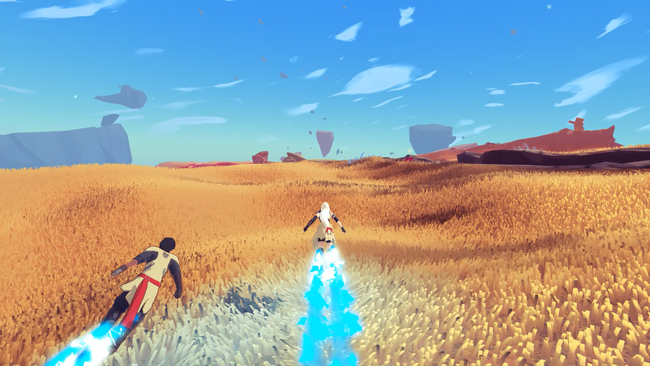
Haven revolves around Yu and Kay, a couple on the run from their home planet. They willingly stranded themselves on the mysterious planet of Source hoping that their past doesn’t catch up to them. Aside from native wildlife, this pair of lovers are the only two people on Source. Their spaceship, referred to as the Nest, unfortunately suffers severe damage early on thanks to an earthquake, and the game kicks off properly once they have to find resources to repair each part of the Nest.
Throughout Haven, both Yu and Kay travel hand-in-hand together across several small chunks of land floating in the air. With their anti-gravity boots powered by flow energy, they glide across the world seeking out not only parts for their broken Nest, but also additional materials needed for the repairs. These manifest as enigmatic crimson minerals, called Rust, that stain the calm atmosphere of Source. Much of your time will be spent cleaning up these mini-islands of Rust as you dig deeper into the mysteries of what happened on the planet you crash-landed on. Not every inch of Rust has to be swept clean though; players will only have to worry about gliding over each of the scattered larger Rust nodes for an entire islet to be considered clear of them, and then the game will notify you once it’s all clean.
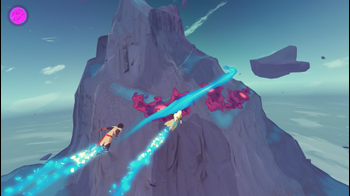
Rust is also a problem because it corrupts Source’s native wildlife and turns them hostile. Battles in Haven are actively turn-based; there’s no strict turn order that everyone adheres to and actions are queued into immediately once someone else’s turn finishes. Yu and Kay are your only party members throughout Haven, but they have a plethora of ways to work with one another. Each has their own melee and ranged attack through Impact and Blast respectively. They can also put up a barrier to either shield themself or the other from incoming attacks. Lastly, once a foe’s HP has been depleted, either Kay or Yu must pacify them to exit the battle or they will get back up again. It’s a nice touch that reflects well on the duo’s kindred spirits; all they want is to live in peace with the planet’s inhabitants after all.
Although Haven can be played alone (like I did womp womp), it largely benefits from playing with a significant other with its two-player co-op mode. Yu and Kay’s actions are mapped independently from one another; on a single controller, one of them corresponds with the D-pad and the other with the face buttons. Each command has to be charged up before executing them and as Haven progresses, there will be more enemies that demand a greater degree of strategy to overcome. Some may rely on continuous duo attacks that the couple must pull off at the exact same time and another may only reveal its weak spot immediately after an attack.
Of course, none of these are insurmountable with one player controlling both, but there is a special aspect of Haven that only surfaces by enjoying a special partner’s company as you coordinate with one another to overcome what the game throws at the both of you. Even the game itself has small touches intended for that kind of play session, such as how Yu and Kay competitively keep count of how many seeds they’ve collected each for their small farm as partners swap control of which character is gliding around the land.
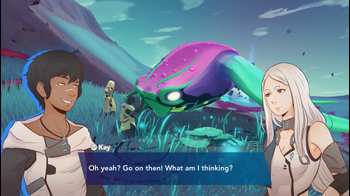
Haven’s greatest strength is attributed to Yu and Kay’s interactions with each other. Being stranded together allowed The Game Bakers to hone in on the couple’s dynamics as individuals and as a couple working through a dire situation. They share their concerns, fears, and worries with one another naturally and uplift the other in their own unique ways to keep moving forward. I think the game leans a bit too hard toward sex jokes and sexual innuendos as a crutch to convey its more humorous elements constantly, no pun intended, so the two young adults can sometimes come across unnaturally juvenile in more serious situations. Still, Haven does a fantastic job conveying that Yu and Kay are a lovable wholesome dynamic duo that truly care and love for one another through thick and thin.
Their banter also utilizes the two-player co-op mode quite well. There are selectable dialogue options for each partner constantly and it’s up to each player to select how they want to respond. You may find out something new about your significant other as you play through the game, since it touches on some bizarre topics that you may have never spoken about to them.
Aside from battles, these conversations between the two also give them experience points. Both Yu and Kay share a single experience meter so they’ll always be at the same level together. Once that meter fills, players have to return to the Nest for a celebratory drink to properly cash in the level up. The Nest is also the place to engage in other activities like cooking, crafting, and synthesizing healing items before venturing out once more. Their interfaces are simple, intuitive, and co-op friendly as each character puts in an ingredient of their choice to mix together.
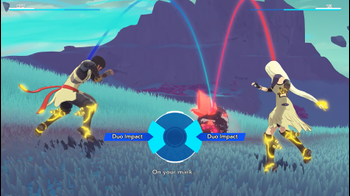
The biggest downfall Haven experiences is its unexpectedly inconsistent thematic implications. While Yu and Kay are lovely together, the narrative that surrounds them is a bit suspect. Without going too deep down the rabbit hole, the two are on the run because they want to be together. Their homeland is rooted in a society built upon the Matchmaker partnering people together based on arbitrary compatibility, and going against this system is, basically, illegal. Obviously, the entire foundation of Haven is built upon being able to freely love whom you want and nothing should stop you from that, against all odds.
Events transpire in Haven that disrupt the peaceful life Yu and Kay are seeking. Along the way, there is a fairly important character they establish communication with. This character is queer and firmly supports the ideas and actions of the society Yu and Kay are originally from. Now whether this character is queer of their own choosing or forcefully by the Matchmaker is not quite delved into. It feels such an odd swerve for the game to paint the sole homosexual representation as an antagonistic force against the freedom to love who you want to love, especially in an era where better LGBTQ+ representation should be pushed for. There are other bits surrounding it that honestly feel like a slap in the face in this regard. Haven was a pleasant, relaxing journey up until this point later into the game. It is addressed and treated so poorly that I found it baffling that The Game Bakers went out of their way to undermine their message so heavily.
Another aspect of Haven that frustrated me is its controls when maneuvering the environment. As you glide around, you can execute a U-turn by tilting the joystick downward. The zone to initiate this feels too sensitive because I mistakenly U-turned far too many times as I played just because I was trying to make a turn. This is somewhat less of a problem on the keyboard, but it’s still prone to happen there too weirdly enough.
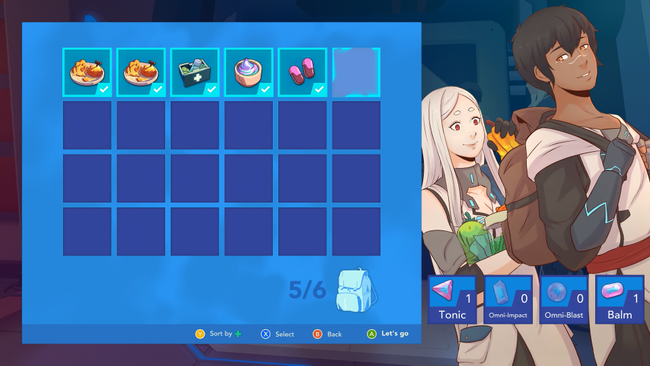
Haven is a really enjoyable time if you have a significant other to play with you. It is a decent experience alone, but many of its core systems are designed to be enjoyed with another person. Severe problems with its narrative tone later into the game that sabotage its themes dampened my enjoyment, and I still struggle to understand why the game twisted itself that way. There is so much to like about this game from its clean cel-shaded look, its ethereally evocative soundtrack, its compelling voiceovers for the main couple, and its intuitive co-op friendly user interface. I am left simply mixed at what could have been a strong title in a largely untapped subsection of modern RPGs.